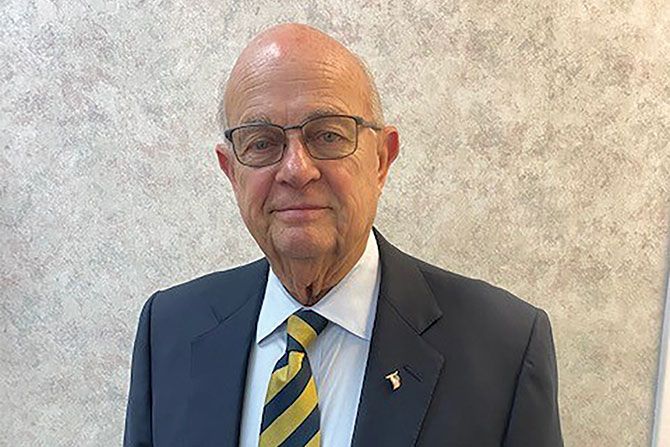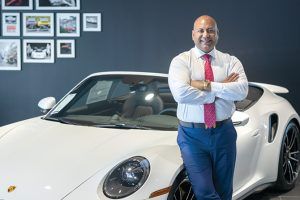This article was originally published in 2021-2022 Issue 2.
In the latter part of 2021, CFADA was able to sit down and talk with Mr. Elliott Burnside of the Central Florida Lincoln Store in Orlando. Our conversation with him was interesting, informative, and even fun. We’re happy to share this little bit of him again in this issue.
He began by telling us a bit about himself: where he was from, his interests when he was younger and things he liked to do while growing up. “I grew up in the central part of Mississippi, in Neshoba County, about 10 miles from Philadelphia, Mississippi. We were country folk living primarily off the land, and my family had all the agricultural accompaniments, like pigs, cows, chickens and a lot of red clay. As a child and young adult, I constantly came up with ways to get away from the red dirt.”
“As a child,” he went on, “I earned money by selling greeting cards, newspapers, and seeds up and down the highway. That continued until the last two summers of high school. Then I lived at a local hotel in Philadelphia and worked there as a waiter and cook.”
We asked him to tell us more about school. “I enjoyed math and science in high school, played all sports, and loved being outside to hunt and fish. I was very active in school, and as I progressed, I joined clubs and attended state conventions for different organizations. The state conventions meant traveling to cities I had never been to, and I liked them. They had different foods and nice restaurants and hotels.”
After high school, he attended Mississippi State University, but in a roundabout way. We asked about his experiences there and to tell us about his bachelor’s degree in Transport and Marketing. “The guy who ran the hotel pushed me to go to college at Mississippi State, but I blew my first year of school there. In the next couple of years, I got married, did my active duty time in the Army National Guard, and attended a junior college.
“While attending junior college, I worked for the local newspaper until I got a night job as a billing clerk for a trucking company. The business interested me, and the job paid me more money than I had ever made. I tried to learn as much about it as I could.”
We asked him what happened next. “The inspiration for my career in the trucking industry came,” he told us, “when executives from other parts of the country visited the terminal where I worked. They were from places such as Chicago, Milwaukee, and Indianapolis. They were always very nice to me, but they worked with the local manager, who then took them out, entertaining them. So I thought, ‘Why not me?’ and began to study transportation.”
Elliott has been all over the world throughout his career. Working in different industries allowed him to travel extensively, to Asia, Europe, the Middle East, and North, Central and South America. We asked him which places he enjoyed the most. “My favorite was Hong Kong,” he replied. “London is in second place.”
After traveling so much and seeing so many places, we were curious when he became interested in the dealership industry. He said, “I met R. Bruce Deardoff socially. He asked me what I did and said he had a project he would like me to do. I did it, he asked me to do another project, and I did that one, too. Then he asked me if I would be interested in managing the Central Florida Lincoln store in Orlando. Travel wasn’t glamorous anymore, so I said yes. That was seven years ago. Working at the dealership has been wonderful and rewarding in many ways. I enjoy the people, there is always some kind of action in the dealership, and Bruce is a great guy to work for.”
We asked how his career benefited him as a general manager. “I have been exposed to many concepts, philosophies, products, people and situations. One of my early mentors taught me to reduce all operations to the lowest common denominator.”
If something fails, one must remember that anything worth doing is worth doing wrong, so learn to accept failure. Failure allows you to experiment and see what works. If you don’t fail, you don’t gain any experience.
Since he mentioned his mentors, we asked him to tell us more about who had mentored him. “Bruce has been my mentor at the dealership,” he explained. “In the trucking industry, my mentors were Ed Randolph and Al Labinger. And in the container business, I learned from Malcolm McLean. He is the father of the containerization industry because he was the first guy to load a truck trailer on a ship. Malcolm was faster with a pencil on numbers than anyone else with a calculator, and his mind seemingly never slept.”
Still on the subject of mentoring, we asked him what would be the three most valuable career suggestions he would tell someone he wanted to mentor? Well, he didn’t have three; he had four: “Number one: dream,” he said. “Have a life goal that makes you happy while you are working on it.
Second, choose significant challenges that have the potential for home-run success. If something fails, one must remember that anything worth doing is worth doing wrong, so learn to accept failure. Failure allows you to experiment and see what works. If you don’t fail, you don’t gain any experience.”
He moved on to number three: “You’ve got to work hard and be persistent.”
And his fourth and final suggestion was, “It is very important how you treat people at work. If you aspire to grow, you will need to be incredibly considerate of other people. People want to do what is expected of them, they want feedback about their performance, and they want to be respected. I tell those I work with every day that I want our customers and other employees to be treated the way I want to be treated, and I want to be treated damn well.”
We wanted to know his feelings about the pandemic, how it has affected everyone and whether it will have a permanent effect on the industry. “The biggest effect is on customer dynamics and how we sell products,” he told us. Especially to younger buyers. Amazon is showing everyone how commerce can be implemented, and other industries are adopting the same ideas. All auto manufacturing companies are taking orders now. People tell us what they want, and we place an order. Soon, they will be able to order a car at the breakfast table, wire in a down payment, and wait for the car to show up.”
Based on how the pandemic may or may not have changed things, we asked him his opinion of the biggest challenge currently facing dealerships in the next three to five years, and how dealers can successfully deal with that challenge. He told us the biggest challenge will be adapting to the market and still being able to make money. “There’s an old saying that individual dealers have to adapt to market changes or die, but if you watch the market, it will tell you what you have to do to survive. Dealerships can’t compete with the depth and breadth of Amazon, but we can select a segment and strive to be the best in that segment that we can.”
We asked him, as he looked back on his life if he had ever experienced an “aha” moment? He had, and he told us about it. “My ‘aha’ moment was when I was a trucking company billing clerk and met the traveling business executives.”
And we wanted to know more about him personally, such as what he enjoys when not working. “I love to cook, eat, and cook what I want to eat,” he explained. “I like trying new things, and I learn from my failures. On Saturday, I get some inspiration from the store and decide what I’m going to make. On Sunday, I start cooking after church. Close friends bring their drinks and come over at 4 p.m. to my experimental kitchen.
“I also enjoy hunting and shooting, but I don’t kill for sport. I eat what I hunt, and I don’t kill unless I can eat it or it’s a threat.”
We asked if he had a favorite car, and what he currently drives. His favorite? “The Navigator we sell. I started driving them in 2005 or 2006 before I became associated with the Lincoln store.” Additionally, he told us he drives vehicles off the used car lot, usually for less than a week. “That shows me how well my team is preparing the car for sale, and I also learn about the cars themselves.” Good research.
We asked him about his family, and you could hear the smile in his voice, “I have a great wife,” he said, “We’ve been married for 20 years now. She is a professional financial officer and a CPA.
“We have two children from a previous marriage and three German shorthair pointers. My son and my daughter each have two children, and we have one great-grandchild. Everyone lives in different parts of Tennessee, and we see them several times a year.”
And finally, we asked Elliott if he wanted to share any last words. “I like what I do. I’ve been incredibly fortunate in my life, and I’m grateful for that. I’ve had many experiences that I absolutely never thought possible.”








